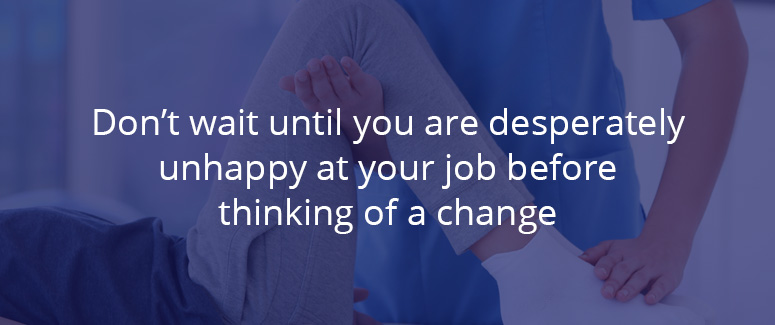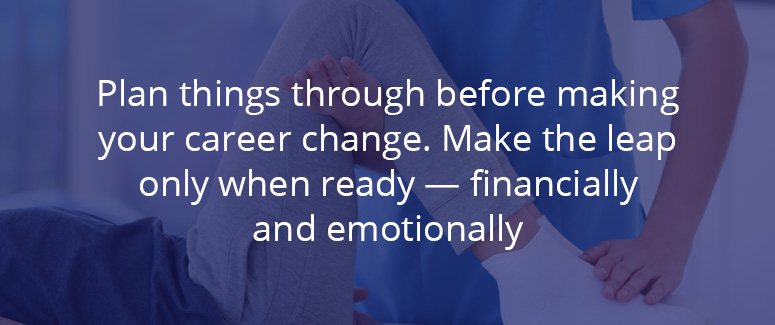I started my finance career in a sales role with Thomson Financial, now Thomson Reuters, in 1997 and was with the company for over seven years.
After Thomson, I moved into investment banking and joined JP Morgan as a vice president before joining the Singapore Exchange.
This was my last role before I decided to make the switch to healthcare. I began as a physiotherapist’s aide, and now I am managing a Senior Activity Centre.
Desiring a change
I lived and breathed numbers at the beginning of my career in finance. For me, the industry was solely about making money, and I began to feel that that wasn’t enough for me.
When I hit my 40s, I started thinking about the type of job I wanted to be doing later in life, and nothing related to finance or banking came to mind.
Instead, I desired to use my efforts and time in a career where I could make a bigger impact on the lives of others.
As a people person, I wanted my career to be a fulfilling one where I would be able to help others. Since I was young, I was always extremely passionate about serving others. I dreamt of being in a vocation where I could better contribute my time and effort.
This is when I started considering healthcare as the industry I would like to spend the final years of my career, before I retire. I desired a role that looked into the long-term health of people that was people-centric yet empathy-driven, the healthcare industry was enticing.
I imagined the healthcare sector to be one that was rewarding but purposeful at the same time. Contrary to naysayers who misunderstand the nature of the healthcare industry, I was eager to discover how I could do my part to contribute to our local community in healthcare.
However, every coin has two sides.
More precisely, a career switch was not possible overnight. Thus, I had to plan ahead in order to make sure that I would not make any hasty career switches or decisions, that might implicate my quality of life.
Find out about WSG’s Career Matching Services and how it can help you in your career journey.
Ensuring financial stability beforehand
Once the idea set in, it stuck. The first thing I did after coming to the resolution that I would leave the financial sector, and join the health care industry was to review my financial status.
Thankfully, my financial advisor confirmed that my discipline in saving and investing during my 20s and 30s, had placed me in a healthy financial state.
I was relieved to know that my financial status was still stable in spite of wanting a career switch.
More importantly, I was encouraged by the fact that I could still make a career switch even this late in my life!
My former line of work taught me to be financially savvy. I started growing my nest from young — I had invested in the property and rental market, which provided me with extra pocket money that I either reinvested or saved. Plus, I am not a big spender.
My main expenses are my insurance plans and my annual vacation. This thriftiness coupled with my savings meant I was able to move into a career with a lower pay scale, without feeling the pinch and ensures I have enough so I don’t need to worry when it comes to my retirement.
To avoid having regrets, I planned my industry and job switch carefully. After two years of planning and soul-searching, I made the leap.
I feel that making this life-changing move while in my 40s has worked out well for me. Among other things, my mindset for making the change is much clearer at this age and I know what I want to achieve in my second career.
Starting from scratch
Indeed, beginnings and change are never easy. The extensive number of years I had spent in finance had left me slightly hesitant and nervous, about whether I could adapt and perform in the healthcare industry.
Without skills in related fields, I was worried about whether I had made the right decision.
More importantly, I was apprehensive about whether I had made the right decision to leave the finance industry. However, over time, I began to adapt and adopt newer skills that helped me excel in the healthcare industry.
When I first made the switch to healthcare, I had to start in a junior role, as I had no relevant experience. My experience in finance was irrelevant to healthcare.
I felt like a fish out of the water at first. Being surrounded by numerous fresh-faced fresh graduates with diplomas and degrees in healthcare affected my confidence a little.
I felt the need to prove myself because of my age.
I joined a community hospital as a physiotherapist aide. This role involved heavy participation and responsibilities in physical therapy. I worked under the close supervision of the physical therapists and rehabilitation specialists in the community hospital and helped them set up treatment rooms.
I also had the opportunity to help patients with their physical therapy. Everything was new to me — health conditions, protocol for infection control, and patient handling.
It was all a blur for the first few months as a physiotherapist aide. In addition, the culture in a hospital environment is very different from that of finance. Unlike the finance sector where everything was fast-paced and dynamic, the healthcare industry was more formal and systematic.
For example, budgets and projects take a longer time to get approved in the healthcare industry and everything is a bit more conservative.
Truth be told — having been in the financial sector for most of my career, it was challenging for me to adapt to the new system.
At times, I even questioned if I had made the right decision to switch career paths. But I knew that I had made the decision to join the healthcare industry and I intended to stick to it.
Overcoming the apprehension and fear of failure was definitely not a walk in the park. But what helped me cushion the switch was my eagerness to learn. Determined, perseverant and headstrong, I was prepared to learn from scratch and took up this job ready to roll up my sleeves, to gain the experience.
Even though I did not have any relevant qualifications at that time, I suppose my bosses at the Community Hospital felt assured by my work record and realised that I was serious about this job, which is why they offered me the position.
During my first few months as a physiotherapist aide, I listened earnestly and carefully. I asked questions and learned from my superiors on the job. In addition, I always asked my bosses for feedback on how I could improve and serve patients better.
I realised that beginnings would always be a struggle, and I was prepared to learn and ask to fully integrate myself into the healthcare industry. Moreover, I strived to remain optimistic in spite of the difficulties which were looming on the horizon.
It was only months later that I finally got the hang of healthcare and my responsibilities as a physiotherapist aide.
Dedication and passion pays off
As I mentioned earlier, my first few months at the community hospital were far from a bed of roses. It was very difficult for me to adjust. Having no background in science, human anatomy and the many different treatments used to target specific conditions was a challenge.
I overcame this by asking more experienced physiotherapists and the Occupational Therapist in charge questions whenever I needed clarification.
It helped that I found the community hospital environment conducive for learning as my colleagues were helpful and open to sharing.
Oftentimes, I also asked the more seasoned physiotherapists for feedback and clarification on concepts that I could not fully grasp.
I was grateful that my superiors were patient and supportive enough to answer all my endless questions.
I also took the initiative to surf the internet whenever I needed answers to common questions, such as when finding out more about specific illnesses, and how certain prescribed treatments could help patients with a particular condition.
I was surprised to discover how much there was to healthcare that I did not know about or understand. Indeed, you really learn new things every day!
My previous industry helped me gain work experience especially in many soft skills, including my leadership abilities.
When the situation called for it, I was always ready to take charge and lead. My knack for negotiation and problem-solving has also greatly helped me in my career in healthcare, especially in my area of focus which is geriatrics.
In particular, negotiation comes in handy when I have to coax my patients out of their beds for treatment; problem-solving helps me deal with their emotional outbursts and tantrums.
I was surprised to find out that my experience in finance could actually help me in healthcare.
I recently completed a six-month full-time Diploma in Community Care and Social Service in Elder Services, and have secured a job with a Senior Activities Centre as a Unit Lead, to run the Centre with three other team members.
The course has provided me with insights into the overall ageing concerns in Singapore, and what can be done to address active ageing among Singaporeans — something I am passionate about.
It also taught me how I could play a part in contributing to our nation.
No looking back
No doubt the journey was challenging at first, but I wouldn’t have had it any other way. Many people ask me if I miss the banking and finance industry. My answer is always a resounding, “Not at all!”
While I earned a comfortable living in that line of work, I needed more than a job that provided material things. In healthcare, I am happy with what I do every day at work.
Nonetheless, I don’t at all regret my years in finance, but I never found it as fulfilling personally as I do healthcare.
Seeing the patients I work with improve is my greatest motivator. I am so glad I made the leap and not a day do I look back with regret.
Indeed, it is never too late for a career switch. Even if you are a mature member of the workforce, take the leap of faith and make a change now!






















